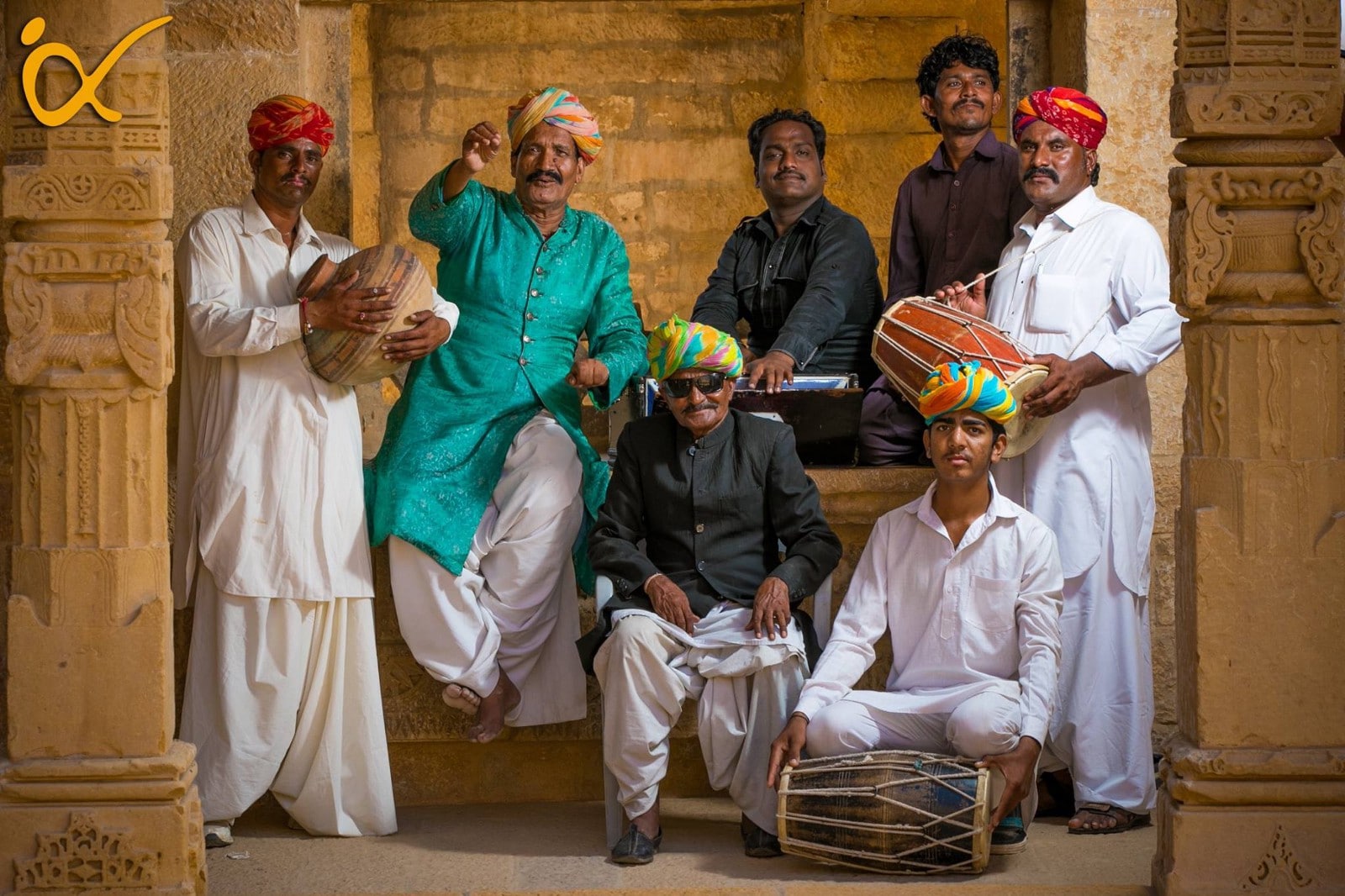
Melodic tales of the Royals
“Amar raho Jaisan-nath
Girdhar ke pyare laal
Sheesh par teehare chaaje
Dwaar par teehare baaje
Ghanan ghanan ghanan ghor
Indra ke nagare”
Be immortal, Oh King of Jaisalmer,
Beloved of Giridhar
Your throne is made of sheesham,
And clouds shower their thundering sounds at your door
Like they do in Indra’s abode
The magical words written in praise of the royal rulers of Jaisalmer, beautifully interwoven with the use of metaphors pertaining to the land of Jaisalmer, form the crux of Hassan and Akbar Khan’s music. Each time before a coronation ceremony, these artists were commissioned to prepare songs especially for that occasion, a song dedicated to the upcoming Maharaja, the heir of the royal family. These royal families have helped these musicians in their upliftment since generations, and like all other musicians in Jaisalmer, music is a tradition in their family too.
These musicians are mainly darbar artists who have been singing for the royal families for 9 generations, and their songs are based on Raagas from Hindustani classical music. They do experiment with variations in terms of taal and raagas at times. The main instruments used for their singing are harmonium, khartaal(Castanet, 4 pieces of wood, played by hand),Ghadaa(earthen pot), and dholak for keeping time. Akbar Khan and Hassan Khan describe their musical ‘Gharaana’ as ‘Alamkhaana’ a titular head of hereditary caste Manganiyar and are professional singers and musicians who traditionally perform to their Jajman (Patrons) Rajput families. As per Akbar Khan, there are several royal ‘Alamkhaanas’ in Rajasthan, namely Jaipur, Bikaner, Jodhpur, Udaipur and Bhuj in Gujarat, but the most prominent one amongst them is Jaisalmer, also called ‘Jaisan’ in the local Marwari dialect.
These artists are singers as well as composers and have been composing songs for the royal families for generations. As Hassan Khan recalls with envy that most of these traditional folk songs were sung by women and described their longing to be with their men. But men long to be with their women too, as love is mutual. According to them, Jaisalmer is famous for its stone, sweets and its beautiful women. The women in Jaisalmer are enchanting and seem to weave a magic on their men.
When asked about the importance of music in their lives, Akbar Khan says “Music for them is like a protein for happiness”. It’s a divine art, used for story-telling. Their songs are sung in praise of the city, its Maharajas, as well as Hindu Gods and Allah alike, once again giving us a lesson in communal harmony and teaching us that Music is not confined to the boundaries of caste and religion.
“Man sarovar, madh pak
paras bhat supher
You are as huge as mansarovar,
And as beautiful as a paras stone
Miley hamsa chug maangna re…
To maanak Jaisalmer re..
The folk singers of Jaisalmer are like Swans(hamsa)
Who sustain their lives on pearls (A hamsa, as per mythology, eats only pearls-moti)”
These musicians are the lifeline of Jaisalmer. It seems that music is imbibed in these stones, arches and majestic ramparts of the Jaisalmer Fort. Each bastion is still embedded with these melodies which will last for a lifetime. Every grain of this vast Jaisalmer desert echoes of tunes sung and transmitted verbally to their children and grandchildren. This hereditary music is transferred by their forefathers and these musicians seek to transmit this knowledge to their children. So far, they have performed and toured in numerous places in India like Calcutta and Mumbai.
As per Akbar Khan, the disciples move ahead and the “gurus” stay behind, and there is no ‘Gharaana’ which is comparable to Jaisalmer in terms of sheer melodic grandeur. He firmly believes that the gen-next should regularly interact with the veterans, learn the true meaning of the songs that they have been reciting for centuries and keep the Guru-Shishya (Teacher-Disciple) system alive.
Over the years, traditions have changed and the demand for folk music has become less, and even many members of their extended families don’t learn this art. According to them, to encourage this art, training centres could be set up or a separate department can be devoted to musical learning in schools. They are even willing to volunteer in music schools if they are well paid and earn enough to sustain their families. ‘The privileged should help the poor’, as Akbar Khan puts it. For this, public participation is very important, but sadly, folk music is losing its importance over time. The “Dharohar” or the musical foundation is endangered. They also acknowledge the importance of basic technical education which is important to sustain oneself in these competitive times. To harness this musical knowledge for the upcoming generations, a drastic change in the paradigm is needed.
From songs ranging to marriage, coronation and childbirth, these musicians have contributed to the music literature of Jaisalmer greatly, and have surely set a milestone in folk music. These musical compositions celebrate the majestic aura of Jaisalmer in a truly poetic manner which appeals to everyone. Their journeys have been full of ups and downs, but their voices will surely echo in Jaisalmer for centuries. As the poet Percy Shelley quotes it:
“Music, when soft voices die,
Vibrates in the memory —
Odours, when sweet violets sicken,
Live within the sense they quicken.”
Their legacy will continue to haunt Jaisalmer long after they are gone, and their songs will still be sung on every auspicious occasion. This musical heritage deserves to be noticed more and should be promoted in a holistic manner. Recognition is necessary for resilience, and to promote resilience and self-reliance in these communities, we must realize the true importance of this musical aspect of the intangible cultural heritage of Jaisalmer.
Miley hamsa chug maangna re…
To maanak Jaisalmer re..

Thank you Anahad for bringing them online. I’m truly amazed to see the beauty of these singers. Loved their songs. I never knew Rajasthani Folk is this rich. Thank you for keeping your tradition alive.